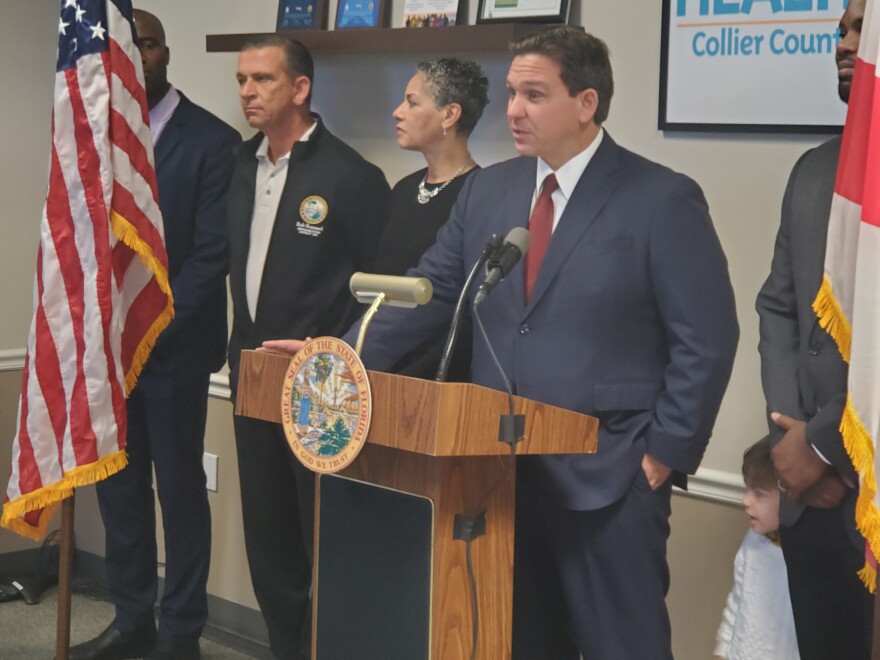Governor Ron DeSantis is criticizing the Biden administration for not providing Florida with the requested number of monoclonal antibody treatment doses against COVID-19. During a press conference in Naples, Tuesday, the governor also discussed his administration’s guidance on scaling back coronavirus testing.
DeSantis criticized the U.S. Department of Health and Human Services for only providing 12,000 monoclonal antibody treatment doses to Florida, when the state had requested 40,000 doses last week.
“Not only do we have 22 million people who are residents, but at this time of year, we probably have 25 million people in the state of Florida when you count snow birds, when you count tourists,” said DeSantis.
“And so, that is woefully inadequate to be able to meet the demand.”
DeSantis said if more doses become available, the state could have a monoclonal antibody treatment clinic running in Collier County in 24 hours.
On Monday, DeSantis announced plans for new monoclonal antibody clinics in Broward, Miami Dade and Palm Beach Counties and in Central Florida.
DeSantis said he’s also looking to add clarity to data on COVID hospitalizations by requesting that hospitals distinguish between patients being treated for a coronavirus infection and patients who test positive, but are in the hospital for another reason.
“We’ve between 5,000 and 6,000 COVID-positive individuals in Florida hospitals over the last four to five days, but I think you’d probably have to say forty percent? Between forty and fifty percent of that are not being treated for COVID and that’s a much higher percentage than we’ve seen in previous waves, but I think it’s a function of Omicron and how it acts,” said DeSantis, noting that the Omicron variant is highly transmissible, but less virulent than the Delta variant.
Florida Agency for Health Care Administration Secretary Simone Marstiller spoke at the press conference and lauded the work of healthcare workers throughout Florida.
“I want to make sure that the people of Florida understand that even during the delta surge, our hospital systems and our healthcare system bent a little bit, but it didn’t break. There was never a time when an individual could not go to the emergency room and be treated and that is certainly true now,” said Marstiller.
Meanwhile, Lee Health reported treating 215 COVID-19 patients in its hospitals, Tuesday, which is up 231% from the number of hospitalized COVID patients reported Dec. 31. Lee Health officials say its hospital emergency departments treated 1,185 patients on Tuesday. Prior to the current Omicron surge, Lee Health ER’s were averaging about 900 patients a day.
In Fort Lauderdale, Holy Cross Hospital has temporarily closed its maternity ward out of concern over staffing shortages stemming from the current surge in coronavirus infections.
Florida Surgeon General Dr. Joseph Ladapo also spoke at Tuesday’s press conference in Naples about the state’s new guidance on COVID testing.
“So, it’s not about restricting access to testing. It’s about deprograming or denormalizing this idea that you can’t go anywhere unless you get tested,” said Ladapo.
“We’re scaling that aback and coming back to something sensible, which is that we really, really, really want you to get tested if you have symptoms and you have risk factors. You can consider getting tested if you have symptoms and you have no risk factors. So, I’m talking about all the young healthy people out there who have absolutely no risk factors and are very low risk for hospitalization or anything worse from COVID. And if you have no symptoms, you know, please don’t get tested.”
The new guidance comes amid a skyrocketing surge in demand and people facing long lines to gain access to tests throughout the state.
DeSantis says his administration is working to get at-home tests to high risk populations such as nursing homes, and that an announcement on that effort is be forthcoming.
In December, the Biden administration announced plans to distribute 500 million at-home COVID-19 tests to Americans.
WGCU is your trusted source for news and information in Southwest Florida. We are a nonprofit public service, and your support is more critical than ever. Keep public media strong and donate now. Thank you.





